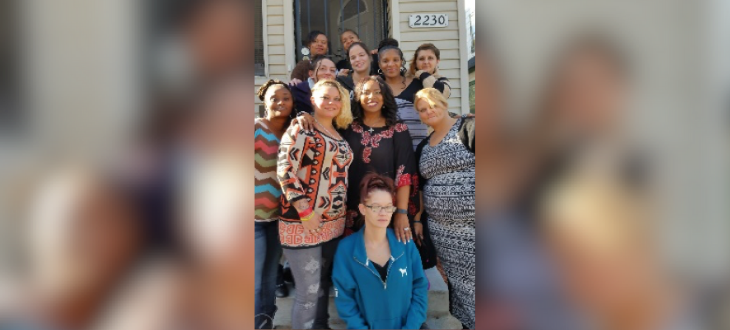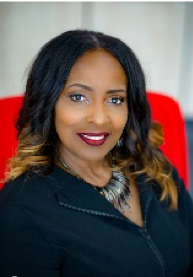Reflecting on the origins of her calling to serve others, Tenisha Gant Watson, Founder and Director of Jordan Community Resource Center, describes her 19-year-old self as “a woman in transition.” After becoming incarcerated, she overcame countless obstacles to successfully reenter society, go back to school, find a stable job and raise her children. However, more than 30 years after her reentry, something still felt incomplete. Tenisha explains, “I was working in a management position, and I felt inspired by a still, small voice that whispered, ‘What about the others?,’ and it hit me. Who’s going to help these other women?”
This calling led Tenisha to found Jordan Community Resource Center (Jordan CRC), a nonprofit organization that provides recovery housing, workforce training, mentoring and other gender-responsive programming for women transitioning out of incarceration and treatment facilities who have been affected by human trafficking and opioid addiction.
Jordan CRC serves women in a holistic way and gives them a safe place to heal from trauma. Celebrating 15 years of service, we asked Tenisha to share the beliefs and practices that have helped empower more than 1,200 Cleveland women to transition into a healthy and hopeful future:
Support Jordan Community Resource Center
Volunteer: Support the administrative office and/or special events.
Mentor: Become a professional mentor or life coach in the Heart2Heart program.
Donate: Give online or donate household items such as dish soap, toilet paper and feminine products.
For more information, contact Tenisha Gant Watson at twatson@jordan4change.org or call (216) 441-2496.
What led you to see a need for these services in the community, and what motivated you to take action?
At 19, I was transitioning from incarceration and had a hard time finding help that was specifically geared to the unique needs of women. At the time, I didn’t even realize that I was a victim of trafficking. The interesting thing about trafficking is that the trafficker is usually someone whom you believe loves you, and you believe you are helping, but in the end, you’re being coerced to do a job. It wasn’t until I was 53 and started working with Judge Cassidy, who presides over the court’s Human Trafficking Specialized Docket, that I heard a woman give her deposition, and I realized, ‘That’s what happened to me,’ and I just began to weep.
When people ask about my passion, I say that when I came home, there was no place for me to go. There was no place where I could recover and get myself ready to take on my children. Very little programming existed for women that dealt with trauma and asked, ‘How can you reintegrate with your children and build trust again?’ That’s a process.
Why is it important to provide services and outreach specific to women?
When we began providing our workforce training in 2012 at the Women’s Reintegration Center, I would always ask, ‘How many of you are in here because of your relationship with a guy?’ 90 percent of them raise their hand, but it’s difficult to put that connection together. Now there is an assessment tool used to identify women who have been trafficked.
Women are relational. If we do well in relationships and have a sense of belonging and purpose in what we do, we tend to thrive. I find that our outcomes are phenomenal because we foster an environment where they’re allowed to be who they are, and they’re given time to heal. Many of them have faced domestic violence or sexual abuse, even prior to trafficking. If those traumas are not dealt with, then it’s very difficult to gain self-worth and the belief that they can achieve something after making bad choices.
How do you approach your outreach?
We build relationships with treatment facilities and courts so when someone with a human trafficking or substance abuse background is identified in those facilities, we send our strategic outreach specialist, Sandy Miller. Sandy is a recovering heroin addict who has gone though much of what we’re talking about, and she has turned her life around. She talks to the women in treatment, and that is how we recruit.
In the court, the Human Trafficking Specialized Docket is so important (a two-year voluntary probation program that requires offenders to address the underlying causes of their behavior). You have these women whose assessments show they meet the criteria. We say, ‘If you go through the docket, you can possibly get your record expunged and receive treatment.’ So a lot of our women say, ‘I didn’t want to come here, but I’m glad I did.’
Can you speak about the unique culture that you’ve built at Jordan CRC?
We help each woman embrace that there is more power in you than you think you have. Don’t give away your power. Women do it in situations with more male dominance; we give away our power and think we don’t have a voice. Well, we do have a voice! You have to learn to say what you want and feel that you’re worthy of having it. Our guests can stay in our housing for up to a year, and during that time, they’re pursuing education, stable housing and financial savings that will keep them stable when they leave.
Our culture also needs to understand what a victim of human trafficking or addiction looks like. It’s not an urban issue. It’s not a demographic, culture or race issue. It’s a human condition issue. We need to deal with that concept and breakdown the barrier of what people think these situations look like.
How do you hope to see Jordan CRC expand?
Another part of the program that I’m cultivating is our school, the Success Institute, which is certified by the Ohio State Board of Career Colleges and Schools to teach IT, customer service, environmental service and basic grant writing. Each certification only takes six to eight months, so why not have these women staying in our housing for a year also get this certification? When you have it streamlined like that, the probability of success increases.
I’m also working with the Land Bank with the goal of acquiring and renovating one- and two-family homes, so after the program, these women have a place to go with their children and still be a part of a sober community.
Can you speak about your relationship with the Cleveland Foundation?
The Cleveland Foundation gave us the opportunity to leverage partnerships and funding support which in turn granted us credibility and access in the courts. They gave us funding for staffing. I don’t know where I would be without the Cleveland Foundation. It’s been such a great partnership that has led to tremendous growth. We actually see triple the amount of women annually in our program since our founding.
Stay tuned for more “Stories of Impact” in our community throughout 2019 featuring Cleveland Foundation partners and grant-funded nonprofit organizations. Looking to donate to a specific field of interest or begin your own fund to support causes you care about? Visit: www.ClevelandFoundation.org/give.




